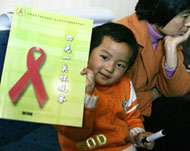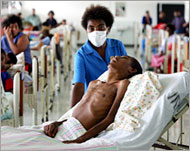UN plea to keep Aids fight promises
As millions mark World Aids Day, the United Nations has said there will be “no excuses” in meeting commitments for the treatment and care of those with the virus and the prevention of its spread.

Marking the official launch of World Aids Day on Thursday, the UN called for an “exceptional response” to the threat and said that while adult infection rates had dropped in some countries due to increased use of condoms and changes in sexual behaviour, the epidemic continued to grow.
Peter Piot, executive director of UNAIDS, said in a statement that the number of people with human immunode?ciency virus (HIV), the virus that causes Aids, hit an all-time high of 40.3 million in 2005. Nearly half of those infected were women.
Piot said the World Aids Campaign had chosen “Stop Aids, Keep the Promise” as its new theme, “referring to the promises that we have all made to deliver the exceptional response demanded by Aids”.
“The lessons of nearly 25 years into the Aids epidemic are clear,” he said. “Investments made in HIV prevention break the cycle of new infections … By making these investments, each and every country can reverse the spread of Aids.
“The commitment to resource and deliver effective prevention, treatment and care services for all who need them is one we must all keep. There are no excuses.”
Asian countries
Asian countries on Thursday marked the World Aids Day to promote awareness of a disease that kills millions in rich and poor countries every year.
Countries across Asia said more focus must be placed on educating young people for the world to have any chance of getting a grip on the disease.
An estimated 8.3 million people in Asia are HIV-positive, with 1.1 million newly infected last year, UNAIDS said in a recent report.
|
“The commitment to resource and deliver effective prevention, treatment and care services for all who need them, is one we must all keep. There are no excuses” Peter Piot |
Thousands marched in anti-Aids rallies on Thursday in India’s plagued northeast, while China rolled out a campaign targeting millions of migrant workers to mark World Aids Day.
India’s sparsely populated northeast, where heroin traffickers cross from Myanmar, is considered a flashpoint because of its high rate of infections among intravenous drug users.
An estimated 5.1 million people are living with HIV in India, the most in any single country except South Africa.
Manmohan Singh, India’s prime minister, called for young people to be taught about safe sex. “You should comprehend the need to educate our young about the modes of transmission of this disease, and leading a healthy and safe sexual life is one of the commitments we must all make,” he
said.
He urged adults in the nation known for its sexual conservatism to shed their inhibitions and discuss sex at home. “This is particularly important given our traditional
inhibitions about discussing such matters within our families and among our colleagues, quite apart from doing so in public,” he said.
Australia announced on Thursday that it would spend $7.4 million over five years to help India fight the virus in the northeast region.
China also focused attention on the disease by starting a campaign aimed at some 120 million migrant workers, with Chinese Central Television showing condoms being passed out to workers at a Beijing construction site.
China’s government estimates about 840,000 people could be infected with HIV and 80,000 others are likely to be living with full-blown Aids.
However, only about 167,000 are registered as being infected.
In Jakarta, the head of UNAIDS criticised Indonesia’s leaders for not taking a more active role in combating the disease.
Piot on Wednesday called Indonesia’s response to the disease “inadequate” and said it was vital that President Susilo Bambang Yudhoyono stepped up and took charge of the campaign.
Ticking time bomb
Afghanistan has recorded only three deaths from Aids, but is sitting on a ticking “time bomb” of HIV with thousands of people injecting drugs, the United Nations and a think tank said on Thursday.
UN Population Fund said in a statement to mark World Aids Day:
 |
|
About 80,000 Chinese are likely |
“The danger is that if it is not dealt with now, it could escalate out of control. Now is the time to act.”
The Senlis Council, an international drugs policy think-tank, said that a particular problem in Afghanistan, the world’s biggest producer of opium, used to make heroin, was the growing number of injecting drug users.
With nearly a million drug users in Afghanistan, about 7000 of whom inject drugs, and few treatment facilities, all the ingredients were present for “an uncontrollable epidemic”, it said in a statement.
In Cambodia, where Aids has killed 100,000 people and left 70,000 orphans, thousands of people gathered in the capital Phnom Penh to mark the day, many waving flags with safe-sex messages.
North Korea marked World Aids Day on Thursday by saying that its people are living free of the deadly disease because of the country’s public health system.
Statistics
The Aids epidemic has claimed 3.1 million lives in 2005 and more than half a million were children, a UN report said.
Close to five million people were newly infected with the virus in 2005, the annual UNAIDS/WHO Aids epidemic update said recently.
 |
|
Two-thirds of all people with |
The total number of people with HIV has reached an estimated all-time high of 40.3 million, the report said.
The number of people living with HIV has increased in all but one region in the past two years.
In the Caribbean, the second-most affected region in the world, HIV prevalence overall showed no change in 2005, compared with 2003.
Sub-Saharan Africa remains hardest-hit, and is home to 25.8 million people with HIV, almost a million more than in 2003.
Two-thirds of all people living with HIV are in sub-Saharan Africa, as are 77% of all women with HIV.